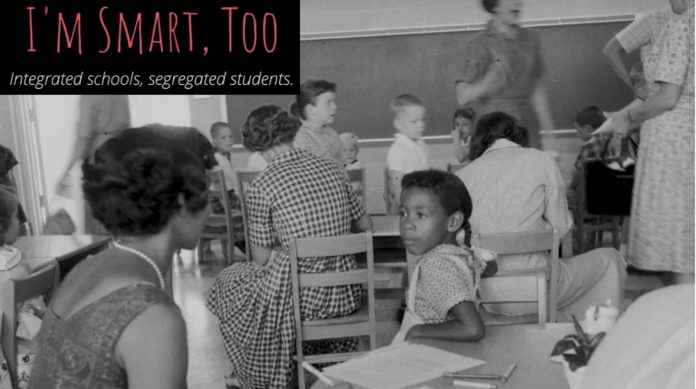
I’m Smart Too, a film produced by local community members and university students to highlight the prominence of the achievement gap in Chapel Hill, is set to screen locally in May.
The mission of the film states: “We have both the power and means to change these outcomes. It is now time to muster the will.”
The film discusses the gaps in the education system and how remnants of the segregation era are the catalyst for children of color being undermined.
The lead producer of the film is Kim Talikoff, who began her career practicing hospital-based and emergency pediatrics in the Bronx, New York, and most recently was a teacher at Estes Elementary School.
Talikoff said that rather than following a traditional narrative structure, the film is laid out as a thematically organized essay.
“It is driven by the feelings and experiences of the participants who narrate the film, several of whom were born in Chapel Hill,” she said. “However, history also helps to connect our characters and moves the audience through the film.”
Talikoff added that because the film is only 30 minutes in length, most historical information surrounding the topic will be available on the film’s website, instead of within the film itself.
She said working in education has provided her with a window into educational disparities and motivated her to begin the production of the film.
“The inception of this film really came from my experience working in the elementary school,” she said. “Teachers need more support to address classroom dynamics, and this support must come from the broader community.”
Talikoff said she hopes the film will allow students, educators and the community as a whole to learn more about the education system and its achievement gap.
Dawn McClendon, the film’s impact producer, graduated from Duke University and has 22 years of teaching experience ranging from inner-city to rural schools.
She said she hopes the film will push residents of the Chapel Hill-Carrboro community to look towards themselves and decide what they are promoting.
“Let’s begin the discussion on how the community can effect some change in the school system that better reflects the values of the whole community,” McClendon said.
She added that interviewing people for the film was one of the most telling parts of the process.
“The most emotionally stirring moment came after hearing confirmation from the interviews that students are internalizing messages that become mountain ranges to scale in academic life,” McClendon said. “This confirmed what I’ve always secretly feared as a teacher.”
She said that although it has been difficult for her to delve further into the truths about this topic, she finds value in bringing the issue to light and informing the community.
“I’m so gratified to be involved in a project that gives a voice to the voiceless,” McClendon said.
Alongside McClendon, Alexandra Odom, a current History Ph.D. student, serves as an associate producer and historian for the project.
Several members of the team are focusing on the photography and videography elements of the project.
Jeremiah Rhodes, a senior majoring in photo and video journalism at the University of North Carolina at Chapel Hill, is the film’s director of photography and editor.
He said the most rewarding part of the process for him has been getting to learn more not only about the education system, but also about filmmaking.
“Working with people like Kim, who don’t have that same heavy film background, has been so helpful because it has pushed me to remember purpose, not just aesthetic,” Rhodes said. “That’s something that can easily get lost in the filmmaking process.”
He added that although the future of the education system may at times seem bleak, he finds hope in the knowledge and understanding of the educators on the film’s team.
“I am hopeful that our film can provide others with that understanding, as well,” Rhodes said.
Darian Woehr, an award-winning documentary filmmaker currently based in Washington D.C., serves as another director of photography and editor for the film.
“I met Kim back in 2018 when the film was just an idea, so it’s been really rewarding to see it through from start to finish,” she said.
Woehr said being a part of this film has helped her connect with people in the community.
“There have been so many trials and triumphs throughout the film’s creation,” she said. “However, I’d have to say the most rewarding part of the process has been meeting all of the people in our community who have opened up their hearts and homes to share their stories with us.”
In addition to Rhodes and Woehr, Aubrey Patti, a documentary editor and producer currently based in San Francisco, CA, is also a Director of Photography and Editor for the film.
Carlos Serrano, the film’s research consultant and a geography graduate student at the University of North Carolina at Chapel Hill, also said that working with the team has been the most rewarding part of the process.
“In addition to working with the team, I have gotten to meet really amazing people that have been wronged by our local school system,” he said. “It makes me understand the importance of working towards justice for black and brown families in this community.”
Talikoff said that if the project is able to secure more funding, it will be able to screen locally, accompanied by panel discussions, in May.
She added that the film has garnered support from participants in the film and other people in the community who have made donations to support the project.
“It’s a complex and nuanced subject and we are happy that so many people feel this is an important endeavor,” Talikoff said. “In addition to members of the community, I have shared information about the film with the district’s equity director, Lee Williams, and he has been supportive of the project.”
Jeff Nash, Executive Director of Community Relations for Chapel Hill-Carrboro City Schools, said he had not seen the documentary and therefore could not comment upon it.











